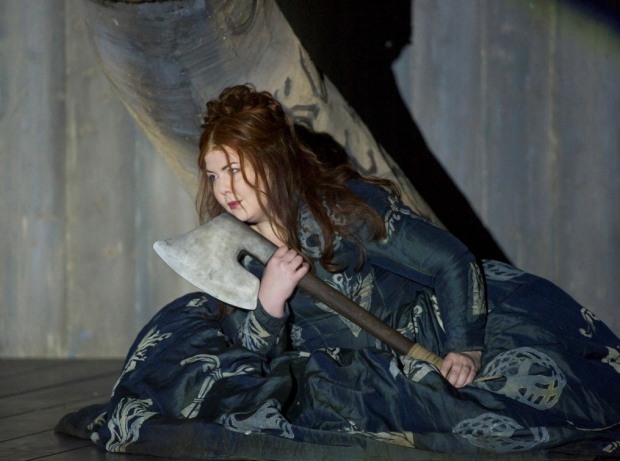Michael Coveney: A chorus of disapproval at the ENO
Following the opening of ”Norma”, Michael Coveney reflects on the controversy surrounding the English National Opera

©Alastair Muir
These are rocky times at the English National Opera. The company is in dire financial straits and has recently lost its artistic director, chairman, executive director and a third of its public funding.
This week’s opening night of Norma – a production by Christopher Alden that was greeted with raucous booing at the curtain call – was picketed by Equity, urging customers to sign a petition protesting at the decision to reduce the pay of the chorus to 75 per cent.
Even the rival Royal Opera House‘s musical director, Antonio Pappano, has expressed outrage, saying – on Equity’s leaflet distributed on the pavement outside – "Plans to reduce its chorus members’ contracts and limit its productions to eight a season threaten to destroy the ENO."
The irony, of course, is that the ENO chorus is the very heartbeat of the company’s creative existence, as indeed is its superb orchestra. The chorus are the foot soldiers of all musical theatre, an idea most powerfully expressed in the great 1976 Broadway musical A Chorus Line and reiterated this week in the celebration of the dancers at the old Windmill Theatre in the resplendent new musical Mrs Henderson Presents at the Noël Coward.
The Norma creative team expressed their support for the chorus – after the audience had risen to them as they came forward – when Alden, taking his boos like a man, pushed his principal singers aside and brought them all downstage again for a second huge ovation.
And the biggest cheer at the first night of Mrs Henderson Presents – after Emma Williams had been justly acclaimed as the leading nude terpsichorean – was reserved for the selection of original elderly Windmill girls who came onto the stage and their 97 year-old colleague who waved royally from the circle.
There will be a full representation of recent musicals at this Sunday’s WhatsOnStage Awards concert at the Prince of Wales – star turns from Kinky Boots, Breakfast at Tiffany's‘s, Grey Gardens and Mrs Henderson – but we’ll all be aware of the fact that big numbers only work because of their setting in a larger populated canvas. Any move by managements to undermine the value of the chorus, the dancers, the musicians in the pit or indeed their collective dignity, is an insult to, and a betrayal of, the whole genre.
Short cuts can sometimes be turned to creative advantage – as in John Doyle‘s stripped back musical productions utilising singers as onstage musicians, or the current delightful new look at Andy Capp the Musical at the Finborough Arms. But this is less easily done in opera, or at least opera on the grand scale, which is what audiences rightly expect at the ENO. ENO themselves say that the chorus members are now free to go freelance for part of the year, but this is like saying that singers on contract can make good the ENO’s own cost cutting by scraping around to balance the company’s own badly kept books.
There seems to be little control over the artistic standards anyway, judging by the dire design of Norma – an ungainly huge tree trunk representing the sacred druidic temple which rises and falls like a giant gnarled phallus on ropes in the flies (sic) – requiring the gorgeously vocalising soprano Marjorie Owens to wobble precariously on a chair mysteriously plonked on the tree trunk and then stand there at the end with Peter Auty‘s equally superb Pollione while a barbecue grill fire laps at the peeling bark.
The chorus, too, are required to do some pretty silly things on bentwood chairs, throwing down bits of costume and making trite processions across the stage. But, as usual, this never seems to affect the glorious sound they make, nor the appreciation of the audience while they make them. We don’t want opera on the cheap at the ENO, nor should London’s second great opera company consider leaving the Coliseum. Something has to be done, and done quickly, to save the integrity and reputation of this great institution, home of the best musical theatre in London whenever Christopher Alden’s brother, David, or Richard Jones, or Jonathan Miller, or Simon McBurney, or Phelim McDermott, or Deborah Warner, is tilling the director’s rudder.












